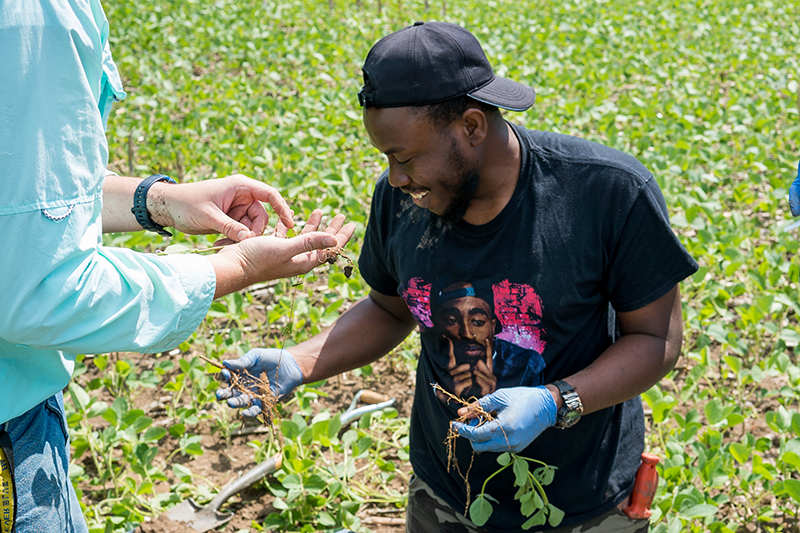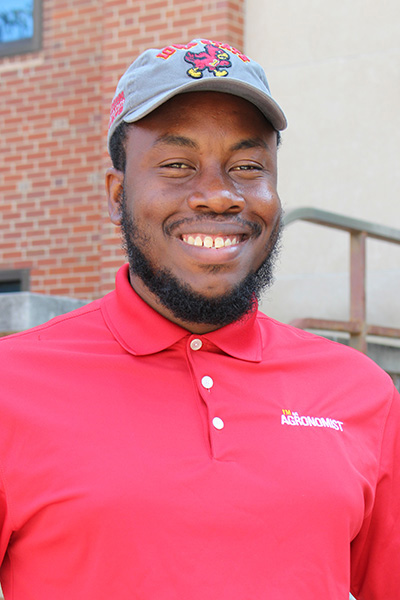
Scientific spark: Student focuses on soils, helping fellow Africans
Growing up in Senegal, Africa, Malcolm St. Cyr witnessed first-hand how food supplies were limited in his country due to farmers’ lack of access to equipment, supplies and transportation to markets.
While Senegal’s soils are fertile and a wide variety of crops are grown, current climate challenges dictate the use of an agroecological perspective, based on organic amendments and rotating crops, to protect soils and conserve moisture. This focus on soils is what led St. Cyr, a junior in agronomy, to enroll at Iowa State University.
St. Cyr was introduced to Iowa State, in a round-about way, via a family friend, Naomi Budelier, who became close to his mom while she lived in Washington, D.C. Budelier had family who lived in Iowa, and when she passed, St. Cyr’s mom traveled to Iowa to meet Budelier’s family, who shared with her the opportunities Iowa State had to offer.
When St. Cyr was considering colleges to attend in the United States, he ran into some issues at other institutions with them being able to quickly analyze his foreign transcripts and provide clear guidance about the application process. He was relieved to find Iowa State understood his situation and provided him the tools needed to make the transition to college successful.
Prior to his first semester at Iowa State, St. Cyr took part in Academic Program for Excellence (APEX), an eight-week academic summer program designed for multicultural first-year students. Through this program, he was able to get a head start on classes toward his degree and meet new students.
“The program helped me transition very smoothly to college,” St. Cyr says.
It also helped connect him with faculty and staff at Iowa State, who today continue to play an integral role in the success he’s found as a student.
“I’ve been lucky enough to meet a lot of awesome people at Iowa State who have helped me thrive,” St. Cyr says.
To gain hands-on learning experience, he has been working in the soil health and soil–plant interactions lab of Marshall McDaniel, assistant professor in agronomy.
“Malcolm has been a great worker in the lab,” McDaniel says. “He’s always engaged in lab meeting discussions and asks fantastic questions. He has what I like to call the scientific ‘spark,’ or the curiosity not just to observe or learn something new, but to understand why.”
This past summer St. Cyr started his own undergraduate research project on how prairie strips affect soil health and soybean productivity.
“My studies and the great experience I have had working with the McDaniel Laboratory have taught me how to quantify soil quality and how soils can be improved, and in that way improve the health of plants,” St. Cyr says. “I have learned how important soil quality and the relationship with plants is to producing more and better results. Without understanding soil health, we will not be able to produce the large amount of food needed to feed the growing human population in Africa or the rest of the world.”
In addition to working the lab, St. Cyr serves as a peer mentor for ACES (Agricultural Community Encourages Success), where he helps students make a smoother transition to college life. He also is an active member of Minorities in Agriculture, Natural Resources and Related Sciences (MANRRS), African Students Association, the African American Studies Society and serves as treasurer of the Maple Hall Council.
St. Cyr was selected as the first recipient of the Cynthia Cambardella Scholarship, named in honor of Cambardella, a former soil scientist at USDA-ARS and in the Department of Agronomy who passed away in September 2020.
Criteria for the scholarship includes selecting an undergraduate agronomy student who has an interest in soil quality and organic farming. Kathleen Delate, professor of horticulture and agronomy, says St. Cyr was the scholarship committee’s top choice for the award.
“Malcolm embodied the kind of student Cindy would champion – she was always assisting students with research ideas and career plans, especially underrepresented students in agriculture,” says Delate, who serves as the Cambardella Scholarship chair. “We are so grateful to her colleagues across the U.S. for supporting this scholarship to perpetuate her legacy in soil health.”
Following graduation, St. Cyr intends to pursue graduate studies, where he can dive deeper into developing “culturally sensitive, sustainable solutions and better ways of farming.”
“I may be able to offer solutions to some problems of most concern to me and the sub-Saharan region of Africa,” St. Cyr says.
He looks forward to spending time in Senegal in the future, working on sustainable/organic projects – one of which just may turn out to be his Ph.D. dissertation.




